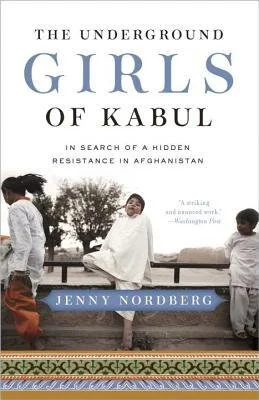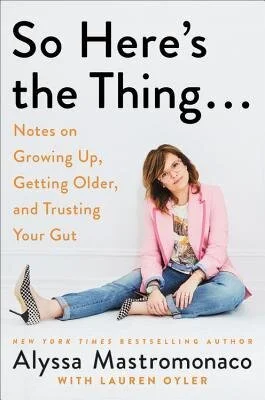The Underground Girls of Kabul by Jenny Nordberg
Title: The Underground Girls of Kabul: In Search of a Hidden Resistance in Afghanistan
Author: Jenny Nordberg
Published: 2014
Type: Non-Fiction
Pages: 311
Oh hi again. After a first-quarter hiatus, I’m back!
I started this post back in December (after reading in October) and just never finished it. I figured I might as well go back and try to wrap it up, though since it’s been so long, I don’t quite remember everything I wanted to say.
This year, I won’t be posting for every single book I read – not that I quite accomplished that goal last year, either. Instead, it’ll be the ones that I most enjoy, or find particularly interesting for whatever reason. I’ve been setting aside books that meet that criteria for the past few months – there are quite a few I want to write about, but it’s manageable.
So here we go!
When I asked Afghans to describe to me the difference between men and women, over the years interesting responses came back. While Afghan men often begin to describe women as more sensitive, caring, and less physically capable than men, Afghan women tend to offer up only one difference, which had never entered my mind before.
Want to take a second and guess what that one difference may be?
Here is the answer: Regardless of who they are, whether they are rich or poor, educated or illiterate, Afghan women often describe the difference between men and women in just one word: freedom.
As in: Men have it, women do not.
In Brief:
I thought this was a really fascinating book about gender and resistance in Afghanistan. The author annoyed me a bit by sometimes being tone-deaf/not acknowledging her own privilege, but her prose was incredible and the topic was nuanced/beautifully human.
Rating: 4.3
Synopsis:
“In Afghanistan, a culture ruled almost entirely by men, the birth of a son is cause for celebration and the arrival of a daughter is often mourned as misfortune. A bacha posh (literally translated from Dari as "dressed up like a boy") is a third kind of child – a girl temporarily raised as a boy and presented as such to the outside world. Jenny Nordberg, the reporter who broke the story of this phenomenon for the New York Times, constructs a powerful and moving account of those secretly living on the other side of a deeply segregated society where women have almost no rights and little freedom.
The Underground Girls of Kabul is anchored by vivid characters who bring this remarkable story to life: Azita, a female parliamentarian who sees no other choice but to turn her fourth daughter Mehran into a boy; Zahra, the tomboy teenager who struggles with puberty and refuses her parents' attempts to turn her back into a girl; Shukria, now a married mother of three after living for twenty years as a man; and Nader, who prays with Shahed, the undercover female police officer, as they both remain in male disguise as adults.
At the heart of this emotional narrative is a new perspective on the extreme sacrifices of Afghan women and girls against the violent backdrop of America's longest war. Divided into four parts, the book follows those born as the unwanted sex in Afghanistan, but who live as the socially favored gender through childhood and puberty, only to later be forced into marriage and childbirth. The Underground Girls of Kabul charts their dramatic life cycles, while examining our own history and the parallels to subversive actions of people who live under oppression everywhere.”
Where I’m At:
I read this book in part on my visit home to see my family in Carlsbad last October, one of the only times I’ve been out of San Francisco since the pandemic began. One of those days, we were visiting some cousins at the beach, and I plopped myself in low-back a chair near my Pop-Pop to read in the sun.
“Hey, Al,” he nudged me, nodding to the book. “What’s your book about?”
I gave him a quick description, and his face immediately darkened. He shook his head. “Oh, how terrible.”
The comment caught me off guard. I hadn’t really been thinking of the bacha posh practice as something necessarily good or bad. I was thinking about it more in terms of what it might say about our conceptions of gender and power, thinking about adaptability and survival, thinking about the characters who were able to enjoy so much more freedom because of it.
But of course, it is terrible, and his comment brought me back to the sobering reality of the situation. It is terrible that, on a society-level, female children in Afghanistan (and elsewhere!) are considered inherently inferior and cannot enjoy the same freedoms as boys unless they undertake this bacha posh endeavor. I still don’t think you can apply the good or bad question to the individual choice of the family – that’s just a symptom of the disease. Regardless, it reminded me of how lucky I am to have never felt like I have less value as a woman.
I was also drawn to this book because of a long-held interest in Afghanistan, originally from reading The Kite Runner in tenth grade (still one of my favorite books, by one of my favorite authors). That book did a lot for me. I was always a huge reader, but it basically changed my philosophy on reading. Previously, I was drawn to fantasy and magic, books where I could escape into other worlds. I drifted around only half in this world, half in the world of whatever book I was reading, or making up in my own head. I was much more interested in the latter.
The Kite Runner was the first book I read that was rooted in this world, in current reality, and really held my interest. I started looking for more like it, and in the process, I started to care more about news, about politics, all the things happening now, real, just beyond my quiet suburb and happy childhood. I realized there was so much I didn’t know, and so much to be done. Not to say that I stopped reading, obviously, but my priorities shifted, and I wanted to be more involved in real-life stories of the world, not just the ones in my head.
Getting Into it:
First of all, Jenny Nordberg is a fantastic storyteller. That’s not always a given when it comes to nonfiction; in fact, in some ways, this book felt more like a novel. It’s very narrative-driven, with efficiently quick pacing, which makes it difficult to put down. Though there are many characters that could be a bit hard to keep track of, many of them only appearing for a few pages, they still all felt strong, left distinct impressions on the reader. With insightful descriptions and keen empathy, Nordberg could really make you care in a short period of time about these people and their lives.
However, one issue I had with the book was that at times I thought it was too much about the author – Nordberg inserted herself into that beautifully-crafted narrative, in a way that I found somewhat unnecessary. My feelings here are mixed, though. On one hand, her heavy presence made it feel uncomfortably Western-gaze-y, too much about Nordberg compared to the people she was writing about. Yet, would the book work otherwise? The people she wrote about wouldn’t find the story itself very interesting, just facts of life. Furthermore, the people reading the book are likely largely going to be Westerners like Nordberg (and me), so with her perspective, we could learn and grow alongside her.
Maybe what really bothered me here was that Nordberg didn’t really address this issue, and the lopsided power dynamic between herself and the Afghans she wrote about. At one point, she even writes about foreigners in Kabul – a great opening for this conversation, but I was left feeling rather astonished by her lack of self-awareness:
No matter who they were in the outside world, or what social class they belonged to, in Kabul a foreigner instantly becomes a member of an upper, ruling class. Like any war zone, this is a place for personal reinvention, where a new, improved persona can be crafted, the past temporarily erased, as demands and social codes of the outside world are put on hold. Joining the expatriate set in Afghanistan is an effective disguise, and one that brings power and excess.
And then she just moves on! There’s a break in the page, then she just continues the story. As if she wasn’t one of the very people she (rightfully) portrayed with such cynicism. She flies around and gets protection from Western troops for the purpose of her journalism – not that I think this is her fault, but she could stand to pause and recognize her immense privilege as a white woman. (I may be biased here as a white woman interested in aid and storytelling, but that’s another rant/story)
What else? It’s a good book for providing a nuanced examination of both Afghan culture, and binary conceptions of gender. For the former, I think there’s a lack of understanding here in the West, a lot of stereotypes, an idea that the country is all violence and repression and extreme religion. Considering the decades-long war and Western military presence, I find that particularly devastating (and another reason the country has always been fascinating to me – seems like the least I could do is try and understand more). Maybe the book could have gone more into the culture overall – one of my book club members referred to it as “losing the forest for the tree,” which I think is fair, but it would have been a much bigger book.
For the latter (gender), this book really just reinforced to me that it’s totally constructed! There’s nothing simple about it – all the bacha posh have unique experiences, but most of them felt fine with being raised as boys. Some of them preferred it, and some of them genuinely felt that they were actually boys – despite the fact that you couldn’t really say they were “born that way,” it was a choice from parents that they weren’t really involved in. But does that really matter? How can you know whether it would be different if they were nurtured otherwise? Nordberg goes more into the science, psychology, and theory behind it… and there’s no good answer.
Of course, despite being all very interesting, I could see the reaction that all of this can seem very foreign, backwards, irrelevant to Western readers. Yet, we all have our set of gendered expectations. Nordberg writes:
Some may call that tragic – that women “are not allowed to be women,” to wear billowy skirts and flowers in their hair, and extend adopt the exterior and mien of men. But that is what most women, in most countries, have had to forgo in border to infiltrate male territory. Ask female executives, lawyers, and those who work on Wall Street how much femininity they can allow themselves to displace on a daily basis. And who is to say that those embellishments are what makes a woman?
I don’t have a coherent answer here, but it’s all worth considering! And I think it makes this book worth reading, even if you don’t think you have a personal stake in what’s going on on the other side of the world. First of all, actually, you do have a stake –I’m not giving an out here. But on top of that, there’s more about the impact of war/trauma, the importance of family, societal expectations and the exploration of identity – more things that affect all of us.






